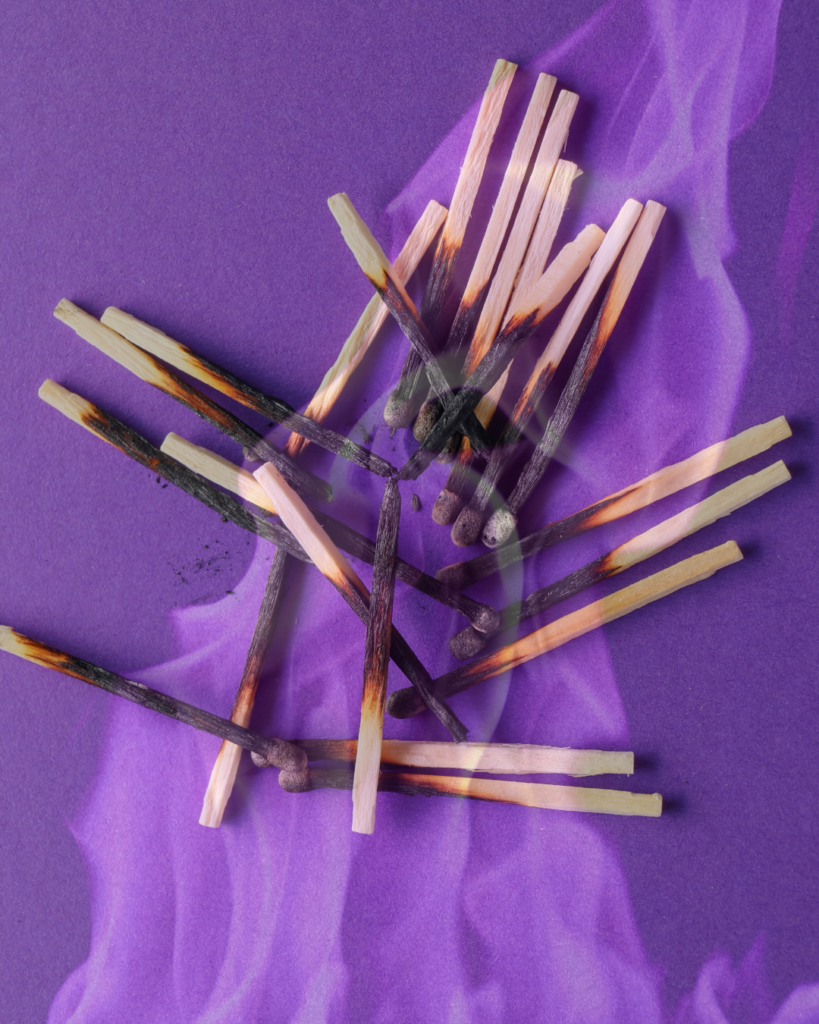Burnout can hit hard, especially for those of us dealing with ADHD. It’s an indescribable exhaustion where your mind and body have little left to give. You’ve kept pushing on through the stress—mentally, emotionally and physically, and suddenly you’re completely spent. Symptoms like severe trouble focusing, feeling super frustrated, or even hyper-fixating on trying to keep your head above the precipice. When the crash comes, it takes your breath away. Burnout arrives in whatever form it chooses. From an emotional meltdown to a dissociative shutdown or even as physical illness or pain. Of course when we are caught in the midst of burnout despair, it’s easy to feel it’s a bad thing. However, what if there’s a side to burnout that could actually benefit us in the long term?
What if ADHD burnout served to spark a fire for personal growth and transformation or even some deep self-discovery?
Burnout is a challenging experience. The only real way to deal with it, is to take a step back from those overwhelming stresses and strains. We must engage in a period of rest and recuperation. I believe this is where we have the potential to learn and grow through the experience.
Let’s examine how burnout can be positive. I’ll share my own experiences along the way!
1. The Wake-Up Call You Need
When you’re living with ADHD, it’s easy to just push through, ignoring those subtle signs that burnout is lingering. Often our traits, and the negative messages we have received, make us feel like we have to prove ourselves. When burnout finally hits, it’s at a point where you mentally and physically can’t mask or hold it together anymore. You feel broken and bruised and like you have gone 10 rounds.
It’s our body and mind saying, “Hey! You’re exhausted and something’s gotta change!” This is the moment we need to take stock of what’s really going on. It’s a battle with ourselves – Admitting to having nothing left in the tank, whilst also fearing being perceived as “incapable”.
For a lot of us, this is the first time we stop to think about how we’re living and working. It can spark some important changes—like setting better boundaries, taking time for self-care, or asking for help. All of this can lead us to a more balanced and relaxed way of living.
For me, I realised that I was approaching burnout when my ADHD seemed to worsen. Despite my medication, I was battling with intense symptoms. Lack of focus and concentration, poor sleep, a hyperfocus related to work. This meant I was working for longer than my contracted hours, and not taking and breaks for hours on end. I was becoming cynical and frustrated with everything around me, and I lost my ability to appreciate the good stuff. Quality time with my partner, family or friends was non-existent.
In my head if I crashed out I was “weak, incapable and a failure”. I had convinced myself that I had to prove to everyone I could work full time with no problems. Even though I was drowning because I was over invested in every aspect of my work.
2. Re-Evaluating Goals and Expectations
ADHD often comes with a heavy dose of perfectionism and an endless to-do list. There is a constant pressure to keep up with tasks. Whether it’s work, relationships, or personal goals, that unfortunately comes with an alter-ego called executive dysfunction. This constant battle between what we want and should be doing, against what we actually can do is soul destroying.
What if we saw ADHD burnout as the point in which we ask ourselves, “Why am I pushing so hard?”. It allows us to re-evaluate our goals, our methods, and our expectations.
Burnout gives us the space to step away from the hustle of our commitments, and reassess what truly matters. We need to take a moment to reconsider whether our goals are realistic and whether they align with our values. This reflection often leads to more achievable, meaningful goals and better alignment with what really matters to us.
I reached a point where I realised my burnout was impacting on my partner. He was becoming more withdrawn and anxious, because I was in a heightened state of alert all of the time. Of course I was convinced I was not valued. Despite all of the evidence of my good work and high standards to deliver support. I started to get more and more frustrated with aspects of my job and began looking for escape.
I realised I need to re-evaluate how I see work and lower my self imposed high expectations. Work is work, life is life. The two shouldn’t encroach on each other if I want to stay healthy and balanced.
3. Deepening Self-Compassion
One of the most powerful gifts burnout can give is the opportunity to develop deeper self-compassion. When we are burnt out, it’s hard to ignore the self-critical thoughts consistently rise to the surface. It’s easy to fall into a cycle of guilt and shame for “not being able to handle it.” However, burnout can also create a moment where we stop and admit we not okay.
Through this experience, we can begin to break free from the harsh self-judgment that often accompanies ADHD. We might learn to treat yourself with more kindness, allowing ourselves to rest and recuperate without guilt. This shift in mindset can transform the way we look after ourselves, which in turn will lead to greater resilience.
My own acceptance has been that I have to instil self compassion into every day. As well as keep my boundaries firm. I need to remember that advocating for my own needs, doesn’t make me unlikeable. I can’t burn myself to make others feel better.
4. Discovering New Coping Mechanisms
Burnout can force a change in our approach to our challenges. When we’ve exhausted all our typical strategies for managing your ADHD, we are compelled to find new ways of coping. These might include learning different techniques, experimenting with new organizational systems, or even seeking professional help from an ADHD coach.
Sometimes we discover that what worked before is no longer effective. Instead of feeling defeated, we can flip the switch and try new ways to do things.
Burnout recovery time provides an opportunity to explore mindfulness practices, seek advice on medication adjustments, or develop more consistent routines. It’s a time to consider all of our options and reset ourselves.
The process might be uncomfortable at times, however, it often results in the discovery. New tools and strategies can lead to greater long-term success and reduce burnouts from occurring again too soon.
I definitely feel I will be going back to work with some stronger boundaries for myself. Specifically around my practice and my methods of working. I am going to spend some time creating structure to my role, and also develop personal ground rules.
5. Embracing the Need for Rest
ADHD minds are constantly firing with ideas, distractions, and impulses, making it hard to slow down or rest. Burnout can serve as a reminder that rest is not only important—it’s essential. We can reconnect with the idea that our productivity isn’t a reflection of our worth. Taking time for rest and recovery is not only valid but necessary for our mental and physical well-being.
For someone with ADHD, resting can often feel counterproductive. Burnout forces us to recognize that we can’t sustain continuous effort without eventually needing a break. Granting ourselves permission to step back can be a form of self-care, which ultimately improves our overall productivity.
I now understand that rest is paramount for me. My sleep can be poor, and even worse during burnout. I have recognised that just resting by doing my colouring, or reading, or listening to a podcast helps me recharge. Therefore, I am focusing on down time being just as important as my work.
6. Strengthening Relationships
When we are constantly “on the go,” burnout can strain our relationships. Especially if those around us don’t fully understand the nature of ADHD. However, burnout can be a turning point for open and honest communication. It’s a chance to share our experiences and let others know how we are feeling.
This vulnerability can deepen our connections and foster more empathy. It can lead to stronger, more supportive relationships where we feel comfortable asking for help and expressing our needs effectively.
I kept heading into my supervision meetings with my manager fully masked. Making the decision to be honest about how I felt resulted in the start of my recovery process. I had prepared for the meeting and emailed her the notes before hand. This was so I couldn’t back out and pretend I was ok, when we were face to face.
It was one of the most vulnerable, honest and transparent conversations we’d ever had in 4 years. I laid everything bare, and I cried a lot. That vulnerability allowed her to tell me what I needed to hear. “It’s time for a break… at least 2 weeks off to rest.” I also think the dynamics of our work relationship shifted. Allowing us more compassion and understanding, along with new sense of mutual respect and genuine support.
7. Encouraging Personal Growth and Resilience
Finally, burnout can be a powerful teacher. As difficult as it is to navigate through, burnout can build emotional strength and resilience. We might learn to identify early signs of burnout before they escalate. This enables us to take proactive steps to manage stress and energy, and most importantly seek support. This heightened self-awareness can make us better equipped to handle future challenges.
Burnout often sparks a period of introspection where we discover our capacity for growth. We might realize we are far more adaptable and resourceful than we thought. Finding new ways to thrive, in a way that we might not have considered before.
With previous burnout experiences, I have learned a little bit more about what I need to stay well. Discovering what I can do to reduce the impact or the duration of a burnout. Burnout doesn’t make me weak, it is simply a part of living with ADHD. I know now that the more I try to fight it, the harder it pushes back. So, instead I will accept and embrace these times. Though being open and honest, I can develop ways of living with it with less disruption.
Final Words…
While ADHD burnout is undeniably difficult, it also has the potential to create an opportunity for positive change. From re-evaluating our goals to develop better coping mechanisms, burnout offers an opportunity for self-discovery and growth. It’s a reminder that slowing down, resting, and prioritizing self-compassion are not signs of weakness. They are crucial to long-term well-being.
In a world that celebrates high productivity, burnout teaches the value of pausing for a second to catch our breath.

